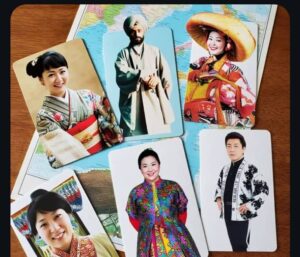PRIMARY 1 – VOCATIONAL APTITUDE
THIRD TERM – WEEK 5
TOPIC: Meaning and Types of Citizenship
Sub-topic: Who is a Citizen? What Are the Types of Citizenship in Nigeria?
Duration: 40–60 minutes
INTRODUCTION (Storytelling Style)
Let me tell you a true story. There was a boy named Timi who lived in Lagos but was born in Ghana. One day, at school, someone asked him, “Are you even a real Nigerian?” That question made him stop and wonder — What does it really mean to be a citizen? Does it mean being born in a country, living in it, or loving it?
This week, we’re going to unpack that puzzle. We’re going to talk about citizenship — what it means, how people become citizens, and the different ways someone can be considered a citizen of Nigeria. Because guess what? Citizenship is more than a piece of paper — it’s identity, responsibility, and belonging.
BEHAVIOURAL OBJECTIVES
By the end of this lesson, pupils should be able to:
-
Explain the meaning of citizenship in simple terms.
-
Identify the types of citizenship in Nigeria.
-
Differentiate between citizenship by birth, registration, and naturalization.
-
Relate the idea of citizenship to their daily lives.
-
Appreciate their role as young citizens in Nigeria.
KEYWORDS
-
Citizen
-
Citizenship
-
Birth
-
Registration
-
Naturalization
ENTRY BEHAVIOUR
Learners already know the name of their country (Nigeria), where they were born, and the state they live in. We will build on this to explain what it means to be a “citizen.”
LEARNING MATERIALS
-
Picture of Nigeria’s map and flag
-
Photocopy of a Nigerian birth certificate
-
Picture cards showing people from different countries
-
Local newspaper clip showing citizenship issues

REFERENCE MATERIALS
-
Lagos State Scheme of Work
-
Computer Studies Textbook Book 3 (for civic digital identity discussions)
EMBEDDED CORE SKILLS
-
Critical Thinking – Who qualifies as a citizen and why?
-
Civic Responsibility – Understanding identity and responsibility
-
Communication – Expressing national belonging
-
Cultural Awareness – Exploring how people from different places can become Nigerians
CONTENT: What Is Citizenship?
Citizenship means being a member of a country. When you are a citizen of Nigeria, it means Nigeria is your country, and you enjoy the rights and do the duties of a Nigerian.
TYPES OF CITIZENSHIP IN NIGERIA
-
Citizenship by Birth
If you are born in Nigeria and your parents are Nigerians, you are a citizen by birth. Example: Sola was born in Abeokuta, and both her parents are Nigerians. -
Citizenship by Registration
If someone is not born in Nigeria but marries a Nigerian or applies to become a Nigerian, the government can register the person. Example: A woman from Ghana who marries a Nigerian man. -
Citizenship by Naturalization
If a person lives in Nigeria for many years, follows the rules, and decides to become Nigerian, they can apply to the government. Example: Mr. Lee from China has lived in Nigeria for 20 years and now speaks Yoruba fluently!
CLASSROOM DISCUSSION
Teacher: “Children, imagine if someone lives in Nigeria for 30 years, speaks our language, eats our food, and helps our people. Should they be allowed to become a Nigerian?”
Pupil A (Cheeky): “Only if they like jollof rice!”
Pupil B (Curious): “Can I become Ghanaian if I live there too?”
Teacher: “These are powerful questions, and yes — where you live, love, and serve can become your new home.”
PRESENTATION
STEP 1 – Revising Previous Lesson
“We talked about farming last week and how it helps our country. But who owns the country? That brings us to today’s topic—Citizenship.”
STEP 2 – Introducing the New Topic
“Being a Nigerian is more than where you live. It is about being accepted, protected, and responsible. Let’s learn how people become citizens.”
STEP 3 – Learners’ Contribution
“Can someone tell me where they were born? Or where their parents are from?”
(Learners share and laugh as they discover the diversity in their class.)
TEACHER’S ACTIVITIES
-
Explains key terms using real-life stories and personal examples
-
Guides the discussion using map and photo materials
-
Encourages class participation and self-expression
LEARNERS’ ACTIVITIES
-
Share their birthplaces and family origins
-
Answer questions about who can be a citizen
-
Listen to the story of Mr. Lee and relate it to their understanding
ASSESSMENT
Ask pupils to:
-
Define the term “citizenship”
-
Mention 3 types of citizenship in Nigeria
-
Give examples of each type
-
Share whether they are citizens by birth or not

FILL-IN-THE-BLANK QUESTIONS
-
A person who belongs to a country is called a ______.
a) Farmer b) Citizen c) Visitor d) Foreigner -
People born in Nigeria by Nigerian parents are citizens by ______.
a) Voting b) Birth c) Marriage d) Travel -
Citizenship by ______ happens when you apply to become a Nigerian after marriage.
a) Registration b) Schooling c) Travel d) Voting -
Citizenship by naturalization is for people who ______ in Nigeria for many years.
a) Work b) Live c) Walk d) Vote -
Nigeria is the name of our ______.
a) City b) House c) Country d) Church -
The government gives ______ to people who want to become citizens.
a) Toys b) Letters c) Citizenship d) Cars -
A Ghanaian woman married to a Nigerian man can become Nigerian by ______.
a) Registration b) Singing c) Talking d) Walking -
People who become Nigerians after long stay are called ______ citizens.
a) Temporary b) Naturalized c) Lucky d) Foreign -
A child born in Lagos by Nigerian parents is a citizen by ______.
a) Book b) Work c) Birth d) Dance -
Mr. Lee became a Nigerian after living here for 20 years. He is a citizen by ______.
a) Naturalization b) Birth c) Water d) Travel
CLASSROOM FAQS
-
What is a citizen?
Someone who belongs to a country and enjoys its rights. -
Can a person be a citizen of two countries?
Yes, it’s called dual citizenship, but not all countries allow it. -
Is every Nigerian by birth automatically a citizen?
Yes, if their parents are also Nigerians. -
Can I become a citizen of Ghana if I live there?
Possibly, through naturalization, just like people do in Nigeria. -
Why do some people want to become Nigerians?
Because Nigeria is a land of opportunity, culture, and community. -
Is it good to love your country?
Absolutely! Loving your country helps you build it. -
Who decides if someone becomes a citizen?
The government decides through legal processes. -
Can children apply for citizenship?
No, their parents apply on their behalf. -
Why is it important to know your type of citizenship?
So you can understand your rights and duties as a citizen. -
Can anyone be denied citizenship?
Yes, if they break the rules or do not meet requirements.
CONCLUSION
The teacher summarizes the lesson by saying:
“Being a citizen is not just about living somewhere. It’s about belonging, contributing, and caring. Whether by birth, registration, or naturalization, every citizen is important. You are the future of Nigeria—young citizens with big hearts.”
The teacher goes round, marks classwork, and offers words of encouragement, reminding each child: You matter because this is your country. Own it. Protect it. Build it.